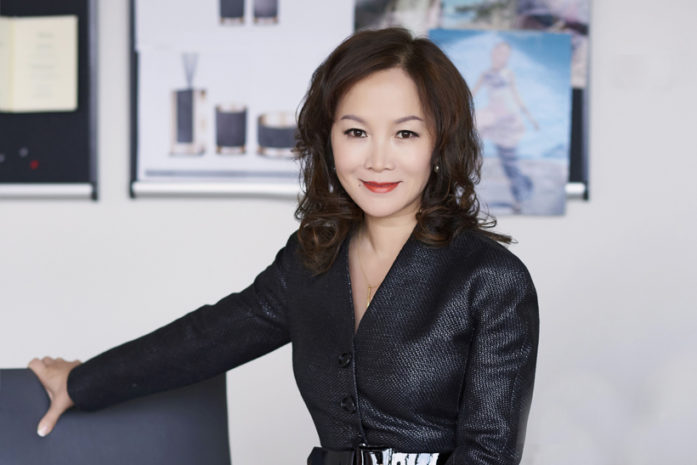Company Founder, a Chinese Immigrant, Brings Factory Jobs from Asia to Maryland
Date: November 28, 2017
In 2011, Chesapeake Bay Candle hit a unique milestone. That was the year the company, which manufactures high-end decorative candles, moved a significant portion of its production operations out of Vietnam and began manufacturing its products in a factory near Maryland’s Eastern Shore.

Photo: Sherri Cunningham / CC BY-SA 2.0
Chesapeake Bay Candle’s co-founder Mei Xu, an immigrant from China, says she decided to move the operations after calculating the rising costs of manufacturing in Asia. “Basically, there was no longer a cost savings due to rising labor and shipping costs overseas,” she says. “I also hoped the factory would provide badly needed blue-collar jobs in Baltimore.”
I believe we stand to gain from people like me coming here from other countries. We are here because we want to get things done, and we want to make a difference by working hard.
The factory, located just outside of Glen Burnie, Md., now employs 80 people. The company’s headquarters, located in Rockville, Md., has another 50 employees working in design, fragrance development, accounting, and other business divisions. Chesapeake Bay Candle employees enjoy good benefits, including retirement plans and healthcare coverage. Working hours at the factory are set up in a way that lets parents pick up their kids from school at 3:30 p.m. “We have low turnover in the factory. The morale is high,” says Xu proudly.
These jobs, she says, help stimulate the local economy, as Chesapeake Bay Candle’s workers can afford a life that is solidly middle-class. “They have a television in every room and a computer for every child. They’re supporting a lot of businesses,” says Xu, who sold the brand for $75 million in 2017 but continues to run the company as its CEO.
As an immigrant who came to the United States and created a successful business, Xu is in good company. In 2016, 40.2 percent of Fortune 500 firms had at least one founder who was either an immigrant or the child of immigrants. These companies make enormous contributions to the United States and the global economy writ large, generating jobs and revenue long after their visionaries retire or move on.
Xu came to United States in the early 1990s to study journalism at the University of Maryland and later got a job at a New York City medical-device exporter. Her then husband and Chesapeake Bay Candle co-founder, David Wang, came with a J-2 visa and worked for a geophysics government contractor.
The inspiration for Chesapeake Bay Candle came one afternoon during Xu’s lunch-break. She was window shopping when she noticed that the clothing in stores like Bloomingdale’s had clean, sophisticated designs but the home furnishings seemed ornate and old-fashioned. “My question was, if someone dressed in a modern way, why would she want to go home to a very traditional grandma apartment? I had been to England and Denmark, and I knew there could be a more contemporary look for the home, but it just wasn’t in the U.S. market yet,” Xu says.
After experimenting with different home-furnishing imports at a wholesale show, Xu realized there was a market for upscale candles with sophisticated color palettes, striking textures and innovate scent blends, like Prosecco Pear and Basil Mint. In 1995, Xu and Wang launched Chesapeake Bay Candle, and the products quickly sold to retailers including Bloomingdale’s, Nordstrom, and Bed, Bath & Beyond.
These days, however, Xu worries about the effect that America’s immigration policy could have on her business. When she and her then husband immigrated here in the 1990s, the process was relatively straightforward. Today, she says that anti-immigration rhetoric as well as bureaucratic hurdles could prevent her from maintaining the workforce she needs; many applicants at the factory near Glen Burnie are immigrants. “Without an influx of immigration, I don’t know if we would be able to fill our factory,” she says. She also recently lost a highly skilled worker who was unable to secure an H1-B visa after a long wait. “It is very disruptive when you train someone and then they have to go back to their home country. You have to start all over again,” Xu says.
Xu would like to see the U.S. immigration system return to a more open and straightforward process. “I believe we stand to gain from people like me coming here from other countries. We are here because we want to get things done, and we want to make a difference by working hard,” she says.
She notes that many other countries do not offer innovators the same level of opportunity. “I’m not sure if I could have made myself a success in China. There are a lot regulatory gray areas there. I’m a very black-and-white person, so it would have been hard. So I’m glad that I took this journey. If you are passionate about something and want to get things done, this is the country for you.”
